Review 2022

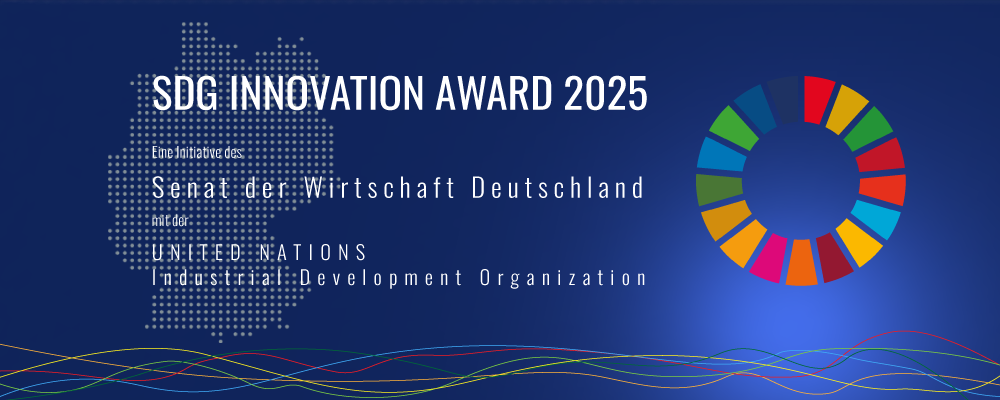
Review 2022
Presentation of the first German SDG Awards
Recording of the nomination announcement at the UN climate conference
Wednesday, November 9, 2022 from 12:00 p.m. to 12:45 p.m. our time in Sharm El Sheikh
Winner of the German SDG Award 2022
Only together can we succeed in promoting sustainable development!
The world needs more people who stand up for a future worth living. Therefore, the nominees get the opportunity to show what motivation, what and who is behind the projects. As role models, they can inspire other people to do the same.
We are pleased about the numerous applications that we have received and thank everyone for sending in their projects, strategies and concepts.
The winners were announced on December 10, 2022 during the festive framework of the annual convention of the German Senate for Economic Affairs in Munich.
A summary can be found below.
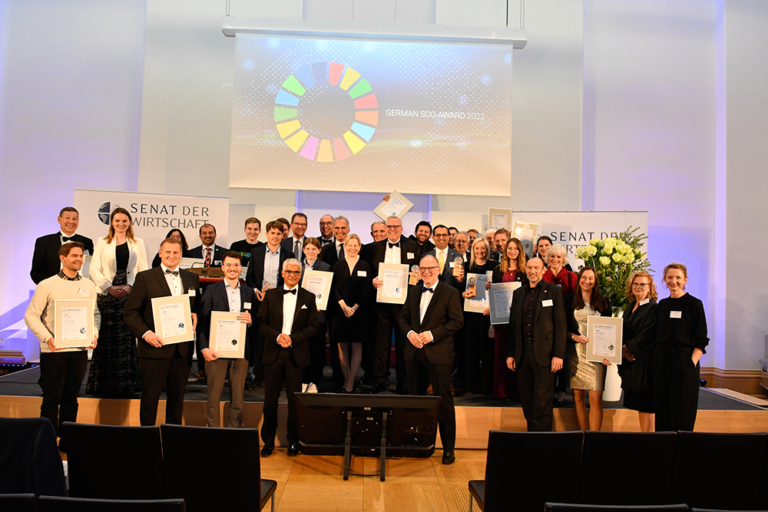
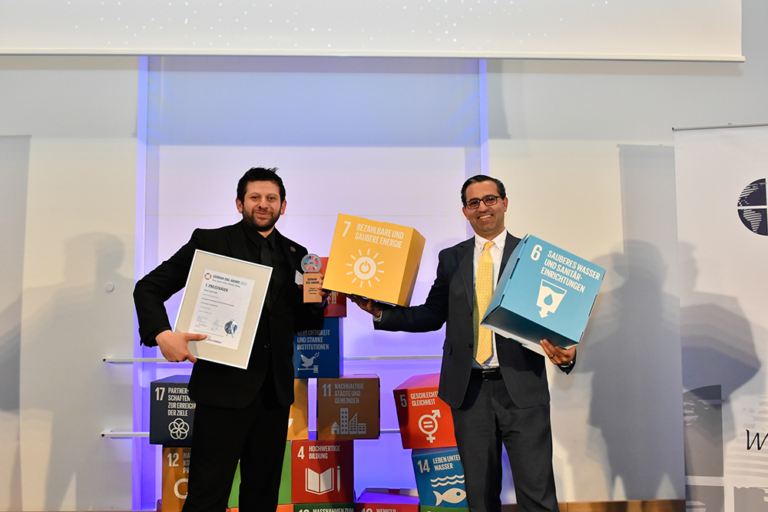
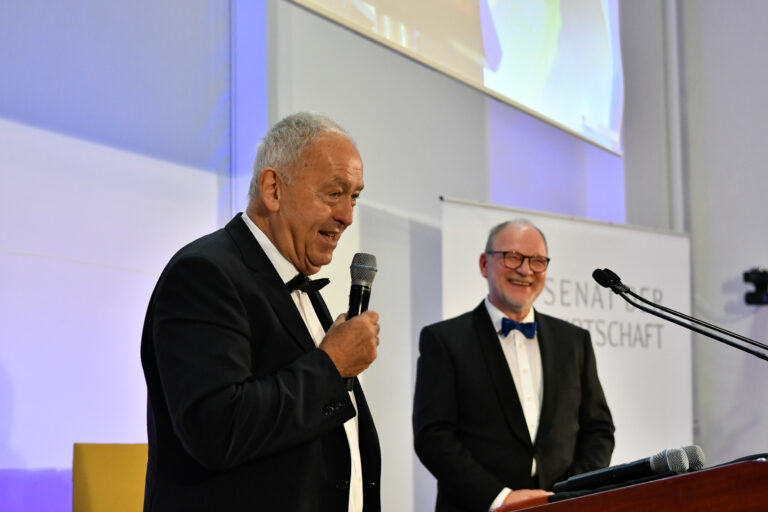
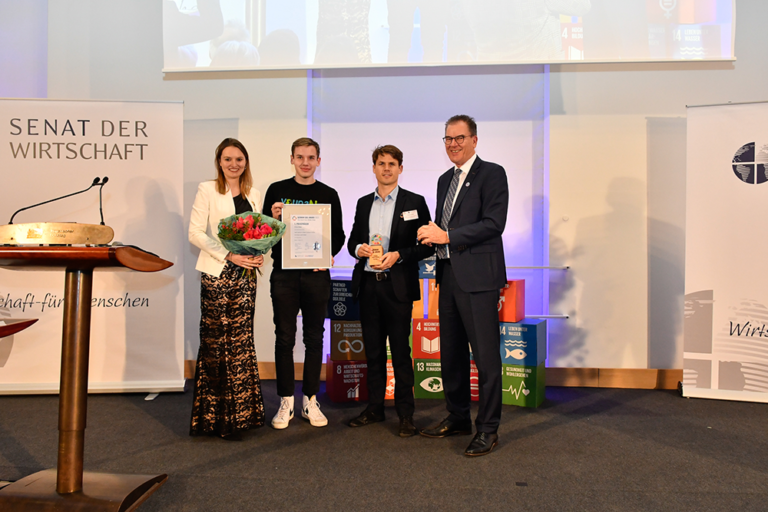
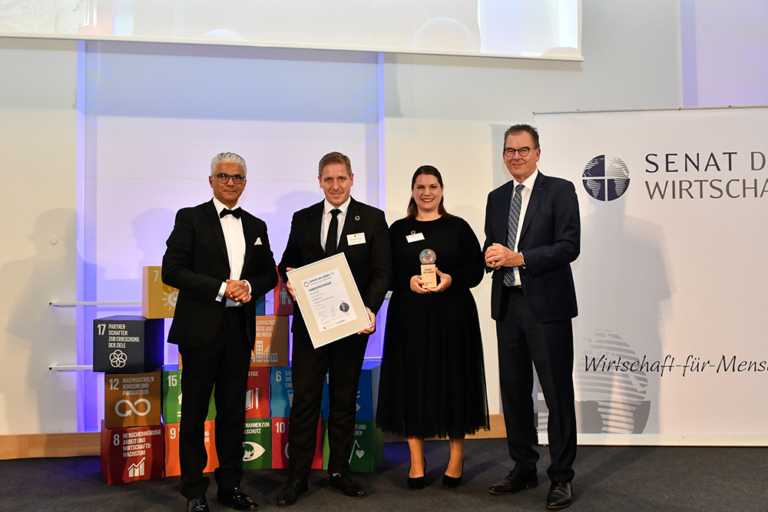
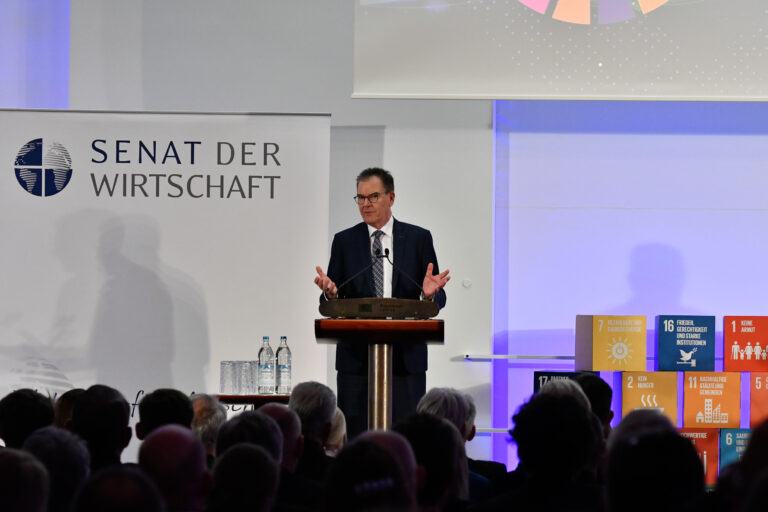
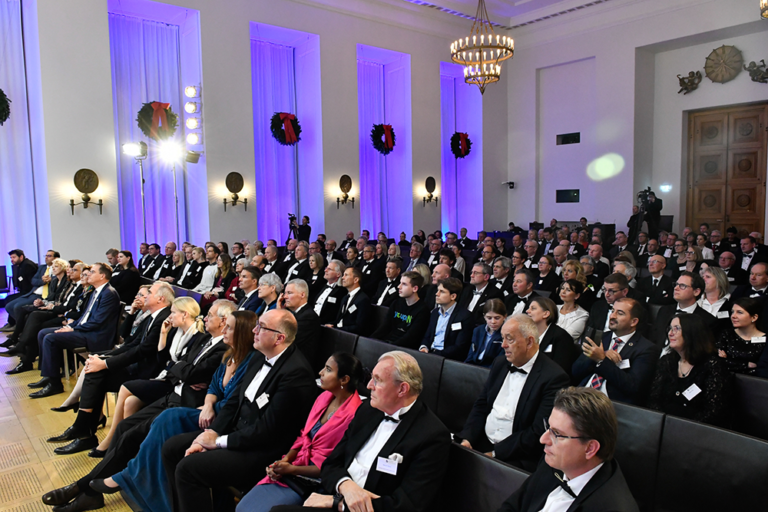
Categories
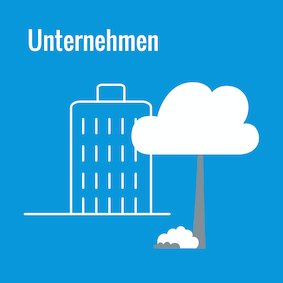
Companies are one of the most important pillars of our society, creating and supporting progress. Activities or projects to promote the achievement of the goals of SDGs are a small step, with a major impact on the entire structure. Exemplary commitment should be recognized in this category and serve as an inspiration and incentive for other economic operators.
Below you will find an overview of the nominated projects with a short profile.
Development and production of water treatment systems based on renewable energies.
Through a decentralized supply of drinking water, e.g. through desalination, but also through hygienic cleaning of the available water, people in all parts of the world receive a good that is necessary for their survival. The cost of transporting drinking water is reduced and people, especially women, are given the opportunity to pursue training education or other activities. The objective is based on securing the (survival) life of people.
Link to the project
Comprehensive initiatives to promote the economic and ecological situation in Uganda, in cooperation with universities and industry.
The quality of life is sustainably improved through the networking of science and industry as well as the involvement of the population. Social communities are actively promoted locally through the construction of hospitals, community centers and housing. The use of low-carbon or carbon-free technologies promotes sustainable regional development. As a side effect, apprenticeships and jobs are created and work is thus actively done to combat poverty.
An example of helping people to help themselves and a real opportunity for sustainable development.
Link to the project
Acquisition and remarketing of used IT and mobile devices from companies and public institutions and the return of hardware that is no longer usable to the economic cycle.
All of the processes required for this are barrier-free and promote local working conditions. 45% of employees are severely disabled (inclusion companies).
By supporting global education projects by providing IT equipment, the company contributes to quality education through equal opportunities in digital learning.
Link to applicant
Development of a uniform standard for sustainable viticulture.
Qualified standards in the entire production chain, from the decimated use of fertilizers to the use of lighter bottles, have a positive impact on the sustainability of viticulture and, in the future, fruit growing as well. Social aspects, such as fair payment for harvest workers, are also kept in mind. The networking of partners from science and practice also has a positive effect on the downstream infrastructure.
An example of well thought-out and comprehensive sustainability in an entire production chain.
Link to the project
The "Society for the Promotion of Partnership with the Third World" is a fair trade pioneer and the basis for today's fair trade standards.
Since it was founded in 1975, GEPA has stood for dialogue, transparency and respect.
With a current cooperation network of 131 trading partners in 46 countries (Europe, Latin America, Africa, Asia), the declared goal is to expand fair trade relations - especially with disadvantaged producer groups in the Global South. In addition, consumer awareness is raised through education and public relations work in order to contribute to better world trade conditions.
Link to the project
Optimization of the production process of PVC window profiles through holistic integration of a recycling cycle.
The measure aims at climate protection as well as responsible consumption and production patterns. By incinerating the PVC profiles in appropriate recycling plants, a granulate is obtained which is completely returned to the production process with consistently high quality. This process can be repeated up to 7 times, increasing the useful life of such a window profile from an average of 30 years to over 2 centuries. This production cycle saves CO2 emissions and increases the energy efficiency of buildings.
Link to applicant
As administrative units, cities, municipalities and districts assume responsibility for companies and people. It is important to maintain, promote and further develop cities, communities and districts as attractive locations in the future. The SDGs can serve as a compass here. With this category, we would like to honor cities, municipalities or districts that implement exemplary initiatives to secure the future of their location. The commitment of the administrative units does not necessarily have to end at the city or even state borders. This should serve as an inspiration for other cities, communities or districts and promote exchange.
Below you will find an overview of the nominated projects with a short profile.
Practical implementation of sustainability in a 1,000-inhabitant municipality with a focus on climate protection and as a prerequisite for the energy transition.
Through early public participation in wind turbines and e-car sharing system for rural areas, the community is already CO2-neutral, has had the highest density of charging stations in Germany since 2016 and does excellent public relations work. There are also research projects with the University of Hanover.
Sustainability is the declared goal of strategic district development.
The district of Euskirchen takes into account the sustainability goals as guidelines for the future in its strategic orientation. Cross-regional exchange and own initiatives should modernize the district by 2030. Concrete projects, such as a district-wide e-bike rental system, car sharing or study projects on modern building, such as facade greening, are the first steps on this path.
Several committees should direct and maintain the focus on the SDGs and thus promote sustainable development.
The constant structural change in the region has already begun and is expected to progress rapidly in the coming years.
Link to applicant
Creation of a local development concept for the implementation of the SDGs. In the future, the municipality plans to become C02-neutral. This is to be achieved by reducing energy consumption, renewable energies and modern construction. A start was made by building a combined heat and power plant, converting to LED street lighting and modernizing the school roofs. St. Peter-Ording stands at the beginning of an ambitious path.
Practical implementation of sustainability at municipal level and with strong citizen participation.
A separate advisory board for sustainability and an appointed climate protection manager work towards the implementation of all SDGs and their own climate protection premises.
For example, companies are given the opportunity to make their own initiatives visible. Cross-school projects actively involve young people in municipal planning. A forest project (35,000 trees) and time-controlled LED street lighting are just two examples of the commitment of the community and stakeholders.
The cooperation between the municipality, business and citizens shows what sustainability can look like in everyday life.
Link to applicant
At the planned Federal Garden Show 2023, the 17 SDGs will be implemented in a clear and innovative way through 17 gardens, each 100 square meters in size, and presented to the approximately 2.1 million expected guests through exhibition formats and a corresponding art and culture program. Visitors are actively invited to enter into a dialogue by using the presentations, information and exchange formats as well as concrete examples, in order to get involved in their community, city and everyday life.
The conversion of a former military site also creates the starting point for a new identity-creating district with a city park, which is intended to contribute to a better urban climate in Mannheim.
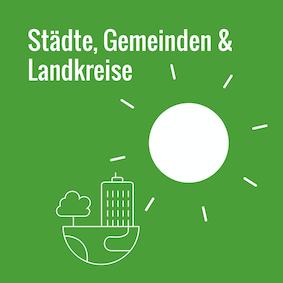
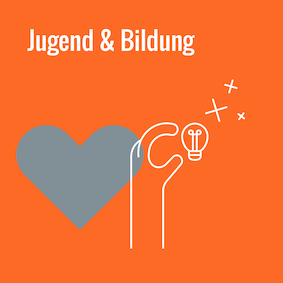
Young people are the future. Their ideas and passion drive change. Guiding them and raising their awareness of sustainable development is pursued in a wide variety of mostly intrinsically motivated initiatives. With an award in this category, we want to draw social attention to these projects and thereby provide motivation and guidance that every effort is a step towards fulfilling the SDGs.
Below you will find an overview of the nominated projects with a short profile.
The youpaN project is a youth participation project in which young people take part in various formats to transform education in Germany into education for sustainable development (ESD).
YoupaN drives the vision of involving young people in political decision-making and design processes so that they can use their ideas to shape social transformation in the sense of the SDGs. Information transfer and active participation, from children's books to politicians' talks and their own youth conference, are central elements. The forum enables essential participation.
Link to applicant
Practical implementation of ideas for environmental protection and insect protection in particular by converting old machines.
By upcycling old chewing gum machines into dispensers for seed bags, thinking about redesigning gardens, balconies and cultivated meadows to create insect-friendly habitats and using digital media, not only awareness of the problem but also practical implementation is demonstrated. Through upcycling projects, lectures, workshops and media presence, many people have been found who will continue the work in their region.
Link to the project
Development of a partnership exchange between schools in Germany and the Middle East.
In order to make the SDGs recognizable as a global challenge and to raise awareness of the connections between global action, partnerships between schools from different nations are sought. The aim of the project is an international exchange on acute problems such as water shortage or climate change.
A connecting project, which strives for a common and solidary future beyond the origin.
Link to applicant (WLS)
Link to applicant (BEI)
Inclusive project that contributes to the transfer of knowledge and information beyond one's own everyday environment and moves the contact with the environment into one's own living environment.
Especially in metropolitan areas, access to nature is limited, as is the case for people with disabilities. In many cases, the expansion of one's own space of experience is not free of obstacles. Through 360° photography and virtual worlds, the project enables easy and barrier-free access to the SDGs for everyone.
Link to applicant
Educational programs to inspire and motivate young people from kindergarten to secondary school.
About 30 projects on topics such as forest, water, culture and energy for different age groups in nine core areas. The projects consider both biodiversity and the role of the respective resource on a regional and global scale. Cultural aspects and the incentive to be “designers of your own future” round off what the project offers.
A comprehensive and inclusive project that teaches students in a playful and experimental way how to take responsibility for themselves and their own future.
